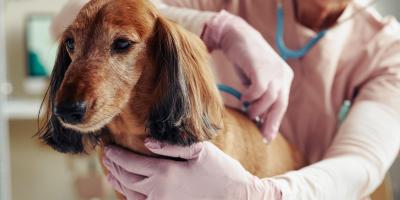Cherry eye in dogs can appear very alarming, as a red, angry looking lump develops in the corner of your dog’s eye – many say that this looks a bit like a cherry. The condition usually requires surgery, but the good news is that it’s usually very treatable and with speedy veterinary help, your four-legged friend will be on the road to recovery in no time.
Keep reading to find out what cherry eye is and the treatment options available.
What is Cherry Eye in Dogs?
Dogs have a third eyelid – also known as the nictitating membrane – which is located inside the lower eyelid. The function of this third eyelid is to slide across the front of the eye when needed, providing an extra layer of protection. The third eyelid also contains a tear gland, and cherry eye occurs when this gland ‘pops out’ or prolapses. The prolapsed gland can appear red and swollen. Sometimes, it pops in and out of its own accord, meaning that you may only notice the cherry eye periodically. However, even if the signs are intermittent, it’s still important to get your dog checked out by your vet.
What Causes Cherry Eye?
It is not fully understood why some dogs are more likely than others to develop cherry eye. However, as VCA Hospitals explain, it is thought that the fibrous tissue that attaches the gland of the third eyelid to the lower inner rim of the eye is relatively weak in some breeds.
Cherry eye is most likely to occur in dogs aged between six months and two years old. However, it can happen to any dog of any breed, at any life stage.
Symptoms of Cherry Eye
Luckily the symptoms of cherry eye in dogs are quite easy to spot – be on the lookout for the following signs:
- A red swollen lump in the corner of the eye closest to the muzzle – this lump may be fairly small or large enough to cover a lot of the eye
- Discharge from the eye may be present, but not always
- Your dog may paw at their eye, which can aggravate the swelling
The main thing you should look for with cherry eye is the red swollen lump – if you notice this, take your dog to the vet as soon as possible for treatment.
Diagnosing Cherry Eye in Dogs
Cherry eye is very easy to diagnose, and in most cases, vets can confirm whether the condition is present just by visually examining your dog’s eye. It’s likely your vet will also carry out a few other tests to determine the overall health of the eye too.
Treating Cherry Eye
Cherry eye in dogs will almost always need to be treated surgically. Historically, cherry eye surgery just involved the veterinary surgeon removing the gland, but vets don’t tend to use this technique anymore. This is because we now know that the gland is very important for tear production, so removing it often leads to dry eye.
These days, the most common procedure is to sew the gland back into a pocket inside the third eyelid. With cherry eye surgery, recurrence is a small but significant risk, and so a repeat procedure may sometimes be necessary. Also, if your dog has cherry eye in one eye, there’s a chance they may develop the condition in the other eye and so may require surgery on the second eye too.
Sometimes, your dog may be prescribed eye drops to use before and after surgery. These may include lubricating drops if the eye is particularly dry, antibiotic drops to prevent bacterial infections and anti-inflammatory eye drops. Eye drops won’t always be given, but if they are it’s very important you carry out the full course and follow your vet’s instructions.
Preventing Cherry Eye in Dogs
Once your dog has had their surgery, you’ll need to follow your vet’s advice about postoperative care in order to reduce the risk of the cherry eye popping out again. This may include making sure your dog wears a cone/lampshade collar to prevent any scratching or rubbing at the eye, avoiding strenuous exercise, and using a harness instead of their collar in order to avoid putting too much pressure on the neck.
Unfortunately, there’s nothing that can be done to prevent cherry eye occurring in the first place, but in order to reduce the risk, it’s a good idea not to breed puppies from a dog who has had the condition.
That’s our guide to cherry eye in dogs! Remember, if your dog shows any signs of the condition, take them to the vet as soon as possible as speedy treatment can increase the likelihood of success.
For more expert tips on senior dogs, explore our other senior dog health articles.

Reward Yourself with myPurina
Earn and redeem rewards for Purina products with the myPurina app.








